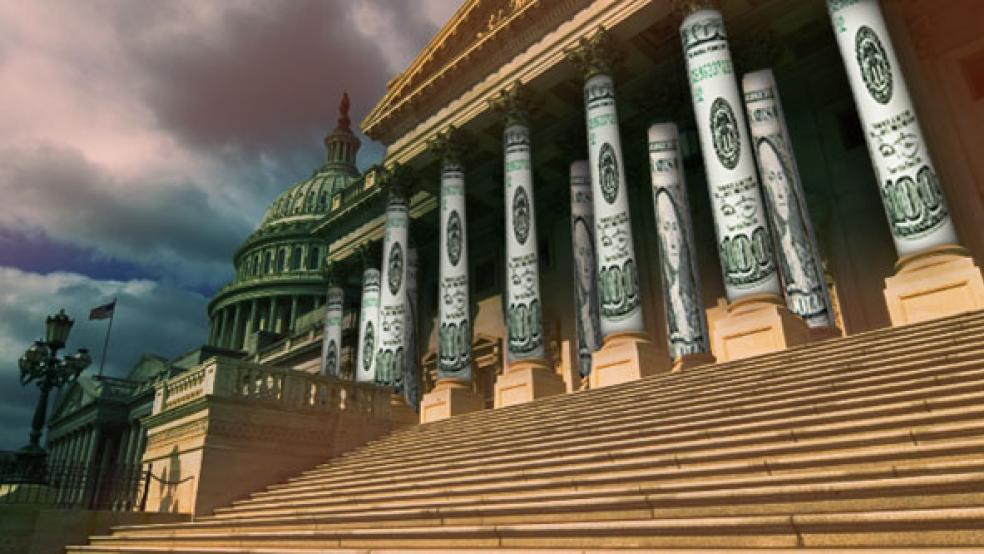The term “crisis” is frequently overused in Washington, never more so than in budget debates. The problem is that a real crisis requires a hard deadline by which time something must happen or something terrible will happen.
There are two hard deadlines approaching, the need to raise the debt limit and expiration of all expiring tax cuts at the end of the year. These two action-forcing events, when combined with more than the usual political uncertainty over control of Congress and the White House next year, mean that the long-awaited fiscal crisis is now here.
RELATED: Election 2012: Obama is Misplaying the Tax Card
As we saw last year, Republicans are perfectly willing to risk default on the national debt to force action on their agenda. Many have said that they will never vote to increase the debt limit, no matter what. Now Republican presidential hopeful Mitt Romney is piling on by criticizing Rick Santorum, his principal opponent for the GOP nomination, for having voted in favor of raising the debt limit while in the Senate.
Eventually, Republicans agreed to a deal that would raise the debt limit in return for $1.2 trillion in automatic budget cuts, apportioned equally between domestic and defense spending. Unless the law is changed, these cuts will take effect on January 1. Both Republicans and defense officials in the Obama administration are alarmed by the impact of these impending cuts.
More importantly, congressional Republicans and the Treasury both thought that the debt limit increase that had been agreed to was sufficient to get past the election. Now it appears that this may not be the case and it will be necessary to raise the debt limit before the election to avoid a default that would roil world financial markets to their core.
RELATED: Another Debt Ceiling Standoff? Please, Not Again!
Finally, there is the expiration of all the tax cuts of the George W. Bush administration and the temporary cut in the payroll tax that was enacted as a stimulus measure. Without action, the payroll tax will rise by 2 percent, the top income tax rate will rise to 39.6 percent from 35 percent, the tax on dividends will rise to 39.6 percent from 15 percent, and the capital gains rate will rise to 20 percent from 15 percent. There is a long list of other expiring provisions as well.
Dealing with all of these issues before the end of the year would be difficult enough in a normal year. But doing so in a presidential election year might be impossible. White House and congressional leaders may be thinking that some of them can be negotiated in a lame duck session after the election. But if there is a radical change in Congress in the election, then all bets are off.
Up until recently, both Republicans and Democrats have been assuming that Republicans would hold the House and probably increase their numbers in the Senate, possibly even getting control. Republicans have been assuming that they would regain the White House. Now those political assumptions are in flux.
The long drawn out Republican race has significantly reduced Republican chances of retaking the White House. And with each of the remaining candidates supported by so-called super PACs with billionaire backers, fears are growing that the party won’t even know who its nominee will be until the convention. It appears almost certain that whoever finally gets it will be severely weakened and unacceptable to significant numbers of Republicans.
Meanwhile, record low approval ratings for Congress are weighing on incumbents of both parties. However, Democrats believe that the burden of disapproval is falling more on the Republicans. Consequently, Democrats now think they will hold the Senate and have a good shot at retaking the House.
Of course, these perceptions could change before November. In the meantime, both parties are trying to figure out how to play budget and tax issues for maximum political benefit. Unfortunately, to the extent that both parties think they will have better cards to play after the election, it reduces the chances that any kind of deal can be reached beforehand. This means that they will just fester all year, adding to uncertainty and risking economic chaos.
With the economy picking up, the Treasury may get enough extra tax revenue this year to put the debt limit problem off until after the election. I suspect that the expiring tax cuts will simply be extended for another year or two after the election unless Obama loses. In that case, he may veto any extension. Senate Democrats may also filibuster any Republican effort to extend them in 2013, leaving the economy to cope with a large tax increase at a time when it may still be fragile.
Clearly, the optimum solution would be a deal this year to replace the automatic budget cuts now in law with a better mix of spending reductions, as well as some kind of tax reform package to replace the expiring tax provisions and get the tax system on a permanent track. But given time constraints and political gridlock, it is hard to see that happening.
One thing is sure. Both sides will use the threat of fiscal apocalypse to energize their voters. How that plays out may determine the ultimate resolution of the nation’s looming fiscal crisis.






